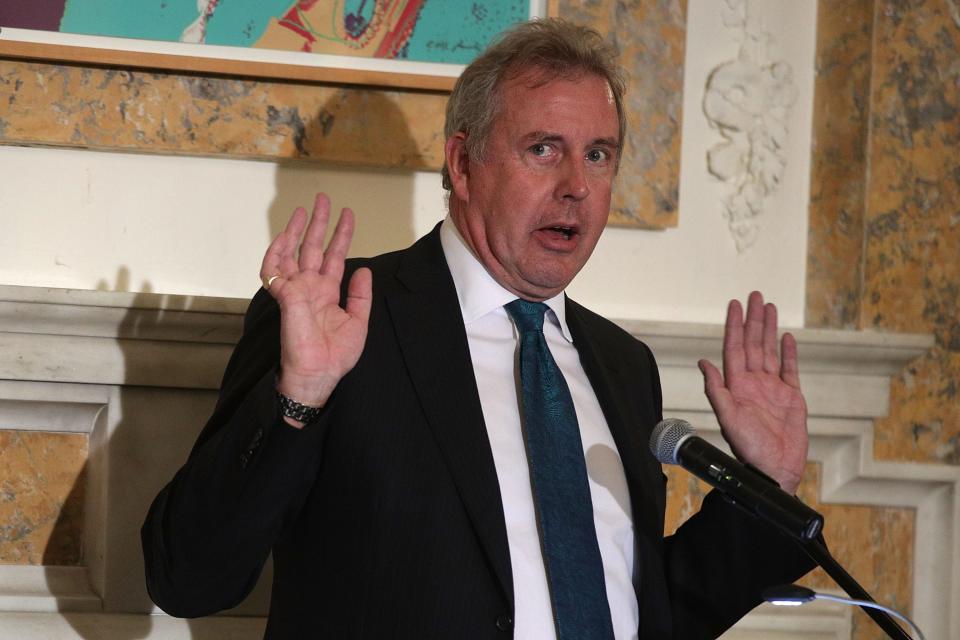Kim Darroch resignation reveals how Donald Trump's insecurities make America less secure

In a series of leaked diplomatic cables published by the Daily Mail last weekend, the British ambassador to the United States made some unfavorable remarks about President Donald Trump. The ambassador, Sir Kim Darroch, described Trump as “inept,” “insecure,” “diplomatically clumsy,” “mired in scandal” and “uniquely dysfunctional,” among other accurate things.
Trump did not take kindly to Darroch’s comments, saying, “We’re not big fans of that man.”
Though not a fan of Britain’s Kim, Trump is a big fan of North Korea’s. This wasn’t always so. Once upon a time, Trump reviled Kim Jong Un and threatened him with fire, fury and other alliterations. This was in 2017, when Pyongyang’s news agency said Trump was “bereft of reason,” “going senile” and a “mad guy” who “spouts rubbish” and tweets “weird articles of his ego-driven thoughts.”
I don’t normally agree with the communications department of the Democratic People’s Republic of Korea, but in this case, its reporting was spot on.
Autocrats take advantage of Trump
Since Trump took office, dictator Kim and other foreign leaders have learned how easy it is to manipulate the U.S. president. Like Trump’s GOP sycophants, they pretend to admire him to get what they want, and very often they do.
Chaos in Trumps's foreign policy: There is no method to his apparent madness
Trump responds to fake compliments with genuine compliments of his own. After Kim addressed him as “Your Excellency” in a letter, Trump announced that he “fell in love” with the North Korean dictator, whom Trump had called “a madman” and “short and fat.” Now they have “a terrific relationship,” Trump said, even though Kim’s height and weight remain unchanged.

According to Trump’s mistranslation, Russian dictator Vladimir Putin once described Trump as “genius.” Trump has called Putin "big," “strong” and “powerful,” along with other words commonly heard in Cialis commercials.
“So far, we’re off to a good start,” Trump said in 2016. “He said, ‘Trump is a genius,’ OK?”
One of the reasons Trump is so nice to autocrats is that they are so nice to him. He has made clear that he is willing to grant diplomatic and even military concessions to dictators if they assuage his fragile ego by flattering him. This usually takes minimal effort on their part. All Kim had to do to get Trump to suspend U.S.-South Korean joint military exercises was to appear with him publicly and write him a couple of letters.
Foreign policy of 'wounded feelings'
Trump has personalized geopolitics to an unprecedented and dangerous degree. In international relations as in interpersonal relations, he behaves erratically and emotionally, not according to any comprehensible strategy. We have only ourselves to blame. While running for president, a reality TV star with no political experience proclaimed unpredictability to be the centerpiece of his foreign policy, and on this score, he has delivered.
North Korea spectacle: Trump would do anything, even undercut America, for attention
Trump’s entire foreign policy is based on his wounded feelings. It matters very little what foreign leaders think of him personally. What matters is that Trump cares — deeply, passionately, inordinately — what they think of him, or rather what they say about him.
On Monday, Trump announced that he would “no longer deal” with Darroch, who had the temerity to say confidentially what everybody knows. On Tuesday, Trump called Darroch “a very stupid guy” and “a pompous fool.” The next day, Darroch resigned. At this point, the only thing Britain needs to do to salvage the special relationship is to hire North Korea’s press secretary.
Windsor Mann is the editor of "The Quotable Hitchens: From Alcohol to Zionism." Harass him on Twitter @WindsorMann
You can read diverse opinions from our Board of Contributors and other writers on the Opinion front page, on Twitter @usatodayopinion and in our daily Opinion newsletter. To respond to a column, submit a comment to letters@usatoday.com.
This article originally appeared on USA TODAY: Trump bullying Sir Kim Darroch exposes flaws in personalized policy

